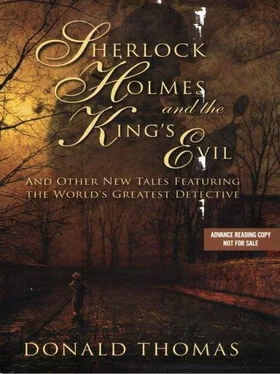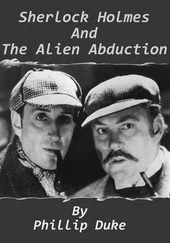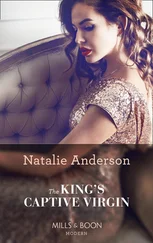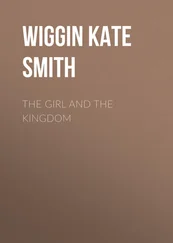In the street, the snow had turned to slush. Our party moved quietly along the far side, out of view of the windows of 100 Sidney Street, behind which might lie an entire Anarchist gang or a single gunman. We crossed over to the exposed side, where Major Wodehouse, Holmes and I drew into the shelter afforded by the stone pillar at the gate of the brewery’s stable-yard. To my astonishment, the Home Secretary remained with head and shoulders in view, his identity plain, staring up at the closed curtains of Martin’s Buildings. He spoke sideways, confirming an instruction. At this, a uniformed constable walked across and banged on the front door of 100 Sidney Street. There was silence. The policeman stooped, retrieved a handful of small stones and threw them at one of the upper windows.
It was at this moment that I saw the slow and sinister protrusion of a rifle barrel from the slit of a partially opened upstairs window. Had they been hand-guns, the chance would have been doubtful but a rifle fired by a trained shot could scarcely miss Mr Churchill at this short range. There was a flash of fire from the gun barrel and a crack that reverberated like thunder between the two rows of houses. I expected to see the Home Secretary fall but he ducked his head and then straightened up again, still standing against the wall close to us. Why did he not keep down?
Now there was a second rifle barrel, protruding from a gap in the adjoining casement. I have read often enough the cliché of a man whose heart was in his mouth with fear but I never knew the truth of it more certainly until that moment. A second crack and a spurt of flame from a rifle barrel came in Mr Churchill’s direction. It was often said afterwards that he had to be compelled to take cover and this, I believe, was the source of that story. A third rifle snout appeared and again there was a bolt of fire and a crack that made the ears ring.
Like a stage magician, after three rifles had missed him at such short range, the gruff figure in the long coat and tall hat turned and walked the few yards to shelter, close to our stone pillar. It was as if the gunmen had recognised who he was, which was quite possible, and were determined to silence him at all costs. For this they paid a heavy price, by giving away their positions and numbers to the firepower which now faced them. Had they held their fire, on seeing the Home Secretary, they might have escaped in the darkness or perhaps even shot their way out before the Scots Guards were in position.
A few minutes later came the crash of a first fusillade from our side. Bullets streamed from the first of the Guards as they hastily scrambled into place. They were aiming from front rooms at street-level, where they shot from behind overturned sofas, or else had climbed up among the chimney stacks. The windows from which the Anarchist rifles had fired at first were now smashed to pieces. Their net curtains were in shreds and one of them was on fire. Then there was a command to the Guards of “Cease fire!” though our ears still rang with the echoes. Presently a further sequence of shots was exchanged, the gunmen this time keeping up the greater rate of fire. I saw one of the constables go down suddenly, among a group who were too close to the far side for their own good. “Jack, I am done!” he cried to his comrade as he spun and fell. He was taken to hospital at once and happily survived his wound.
After the first rifle shots, the weapon of the assassin, our opponents’ fire came from handguns. They laid down a barrage with which we could not at first compete. I could make out the long barrels of their Mauser automatic pistols, firing two shots every second. But while their hand-guns might be deadly in intensity they were less accurate than the rifles which their marksmen had used at first. Why had they abandoned those? As it was, their rifle barrels had merely revealed their positions. They had drawn a ferocious fire into the two upper windows of Martin’s Buildings, possibly killing half of those within. Had it been the Home Secretary’s intention to make them show themselves by offering his familiar figure as a target?
The events that followed during the next few hours were printed large in every newspaper across the land. What schoolboy did not know of “The Siege of Sidney Street” and the famous part played by the Scots Guards and Winston Churchill? Even as it progressed, the crowds and the pressure grew behind the police cordons at either end of the street, raising cheers every time our men fired back. It seemed impossible that this was the heart of London on a peaceful weekday morning, when office clerks and shop walkers were on their way to work and schoolchildren trudging to their classes. All had now played truant to watch the drama being played out.
Holmes and I remained under cover for the moment behind the gate-pillar of the coal merchant’s yard. What struck me most of all was the way in which many of the inhabitants of the street went about their normal lives as the two sides exchanged fire and the bullets sang round them. An old women with a shawl over her head crossed the street a little further down to fetch her washing, as indifferent to those bullets as if they had been the falling snow flakes.
In the coal merchant’s gateway a young journalist, the first I had seen that morning, was standing beside me leaning on his stick. He gave a lurch and almost fell as the stick was neatly cut in half by a bullet which we neither saw nor heard-and which was within inches of ending his life and depriving the world of the genius of Sir Philip Gibbs. A piece of stone flew from the corner of the wall beside me as a shot nicked it and another fragment bounced from the metal helmet of a startled policeman. Before long a reek of burnt cordite hung in the damp air and the acrid tang of it scorched one’s throat. The sharp cracks of the service rifles were answered by the snaps of pistols from the besieged Anarchists. This was the point at which we were ordered to remove ourselves to safety.
It was not a time to indulge in irony but I could not help noticing, above the level of the gunmen’s positions, an attic floor running along the eight houses of Martin’s Buildings. In its window was a sign showing, of all things, the Union Jack flag on a large card with the slogan of “Union Jack Tailoring.” Much tailoring would be done that day!
Before long the press had arrived in numbers, greatly to the satisfaction of the landlord of the Rising Sun, who was able to hire out his flat roof to the reporters after all. Captain Nott-Bower of the City Police stood beside us, watching the front of the besieged houses while his inspector organised a cordon at the rear. It was intended that there should be no reinforcements for the Anarchists and no escape. That, at least, was a matter of opinion in the confusion that existed. These were men capable of fighting the police through sewers and over rooftops, if necessity demanded. In Russian uprisings they had already done so.
Only now were the reporters allowed to know that shots coming from the houses on our side were fired by the Scots Guards and that the Home Secretary was directing the operations. I overheard an exchange between Mr Churchill and Lieutenant Ross, the latter asking whether it was intended that his men should presently storm the houses opposite.
“Nonsense!” said Churchill’s gruff and emphatic voice, “do you not see how easily you might trap yourselves in a bunch on those narrow stairways and confined passages? That is just what they would like you to do. I should prophesy the most grievous losses among your detachment. You have only two sergeant-instructors and nineteen men. You cannot afford to lose a single one. No, sir, you must fight it out where you stand.”
In truth, the Scots Guards were no longer standing. At either end of the street, newspaper boards had been thrown flat and guardsmen were using them to lie upon as they directed rifle fire against the windows. The Anarchists emptied their pistols repeatedly. From time to time we glimpsed the hand which held a gun as the grimy shreds of lace curtain were edged aside. Once I saw the side of a face, when the man who had fired drew back behind the wall. To have stood behind the curtain in the window opening would have been certain death, as the guardsmen’s bullets streamed in.
Читать дальше












